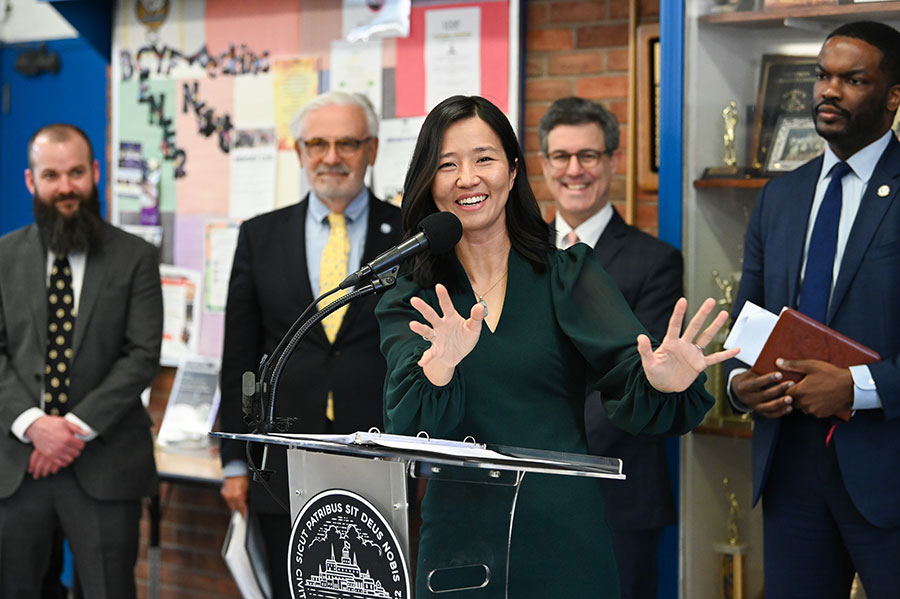- Home
- About
- Leadership & Administration
- Strategic Plan
- Strategic Priority 2: Impactful Research & Scholarship
- Mayor Wu Announces $2.5M Grant to UMass Boston
Menu
- Leadership & Administration
- About Chancellor Marcelo Suárez-Orozco
- Chancellor's Cabinet Members
- Senior Leadership Team
- Chancellor's Staff
- Chancellor Event Request
- Chancellor Meeting Request
- Chancellor's Reports
- Campus Plans
- Faisal-Nichols Honorary Scholarship
- Strategic Plan
- Beacon Budget Model
- Chancellor's Lecture Series
- Beacon Wellness Initiative
- Restorative Justice Commission
- Mission
- Facts & Figures
- Accreditation & Rankings
- History of UMass Boston
- Student Consumer Information
Mayor Wu Announces $21 Million for Behavioral Health Services and Programming for Youth and Families
Boston Public Health Commission and Boston Public Schools are partnering with local universities and community partners like UMass Boston to add more behavioral health specialists, improve BPS policies and systems, and develop a more diverse workforce to serve youth in Boston.

Mayor Michelle Wu, the Boston Public Health Commission (BPHC), and Boston Public Schools (BPS) have announced $21 million in transformative funding for mental and behavioral health programs and services to support the city’s youth and families.
The funding includes a $2.5 million grant to UMass Boston for “Transforming Boston Access to Mental Health,” which focuses on preparing diverse, youth-facing practitioners to serve Boston communities. Fellows will receive education, training, and fieldwork and commit to practicing in Boston. Across three years, 185 students will be trained to serve 1,750 clients, with over 850 being youth. To date, 39 students are enrolled and 34 youth and 44 non-youth have been served.
"Consistent with UMass Boston’s anti-racist, health-promoting ethos, our grant will prepare cohorts of culturally, linguistically, and racially diverse Fellows to become human service and mental health providers,” said UMass Boston Chancellor Marcelo Suárez-Orozco. “We share the Mayor and Commission and BPS’s goals to advance racial justice, health equity, and more accessible behavioral health services so we can address the growing need for mental health resources among minoritized and marginalized youth.”
A $5.8 million grant for Boston Public Schools, in partnership with UMass Boston, Boston University, Brown University, and community partners, will launch “Project PROVIDE,” preparing 200 school psychology, school counseling, and social work students to serve Boston youth over five years, serving more than 46,000 students.
The goal is to increase the number of diverse, highly qualified mental health staff that work in BPS while also improving technical and supervisory skills of the current mental health workforce that works in BPS or with BPS students. This grant will enable BPS to more effectively convert trainees into employees in order to fill vacancies and support the retention of mental health providers.
The investments are part of the city’s response to the urgent need for more mental health supports for young people and to develop a larger and more diverse behavioral health workforce. These investments over five years will serve more than 50,000 students, directly impact 21 BPS schools, support more than 600 people in pursuing behavioral health careers in Boston, grow and diversify BPS’s mental health staff, and provide more than 1,000 people with behavioral health training to better serve youth and families in Boston.
“The past several years have been difficult for all of us, and that’s especially true for our young people,” said Mayor Michelle Wu. “That’s why it is so important for us to make life saving investments now, to support Boston families and make sure our youth get the high-quality care they need.”
According to BPHC’s newly released Health of Boston Mental Health Report, there is a significant increase of Boston youth feeling sad, anxious, empty, angry, or hopeless, especially among youth of color. Currently, 1 in 3 BPS students reported feeling persistent sadness, while in 2015, 1 in 4 youth reported feeling this way. The data show this is even more severe for students that are marginalized or identify as female or LGBTQ+. According to the Health of Boston report, Black female youth face the greatest health disparities, with higher rates of emergency room visits for mental health crises compared to their peers and higher rates of suicide attempts requiring medical treatment.
“These data and conversations with communities highlight the need for more behavioral health services for youth, especially services that address the unique needs of Black, Latinx, Asian, LGBTQ+ and other underserved communities,” said Dr. Bisola Ojikutu, Commissioner of Public Health and Executive Director of the Boston Public Health Commission. “We created BPHC’s Center for Behavioral Health and Wellness to find meaningful and strategic ways to reduce behavioral health inequities. This partnership between Mayor Wu, BPS, and the Center demonstrates our commitment to providing culturally responsive and linguistically appropriate services to young people and their families in Boston.”
“I am hopeful and eager to uplift our youth and families by addressing the urgent mental and behavioral health challenges they face,” said Boston Public Schools Superintendent Mary Skipper. “These investments and partnerships with educational and youth-focused institutions are vital steps toward strengthening our systems of care, and in doing so, nurturing the emotional well-being and educational development of our students.”
The $21 million is from federal funding and grants, including the American Rescue Plan Act (ARPA), the U.S. Department of Education, and the Substance Abuse and Mental Health Services Administration (SAMHSA).
For a full breakdown of investments, read the full press release.